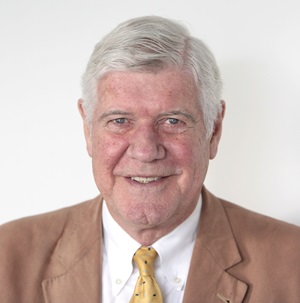 Professor Graham Richards CBE FRS, Emeritus Fellow at Brasenose College, has been elected to the Royal Society. He first came to Brasenose as an undergraduate student in the 1950s, then progressed to doctoral study and became a tutor and fellow of the College in 1966. He was Oxford’s first Chairman of Chemistry and served from 1996 to 2006.
Professor Graham Richards CBE FRS, Emeritus Fellow at Brasenose College, has been elected to the Royal Society. He first came to Brasenose as an undergraduate student in the 1950s, then progressed to doctoral study and became a tutor and fellow of the College in 1966. He was Oxford’s first Chairman of Chemistry and served from 1996 to 2006.
As a young graduate student, he was part of the first generation of researchers using computation techniques to solve scientific problems, and he went on to become a pioneer in the field of computer-aided molecular design. He produced the first ever colour graphic images of molecular structures. With then Brasenose student Tony Marchingham he also founded Oxford Molecular, a company which provided software to researchers, and later helped set up Oxford University Innovation, which focuses on technological transfer. This innovative company is developing virtual screening and searching technologies for drug discovery and has identified a promising new class of antibiotics. Graham organised the Screensaver Lifesaver Project —the largest ever-computational chemistry project that made use of idle time on over 3.5 million personal computers – screening billions of compounds in the search for drugs to treat cancer and protect against anthrax and smallpox. He is currently founder chairman of Oxford Drug Design Ltd, which is concentrating on the design of novel antibiotics.
The origins of the Royal Society date back to 1660, when a ‘learned society’ followed a lecture at Gresham College by Christopher Wren. Joined by other leading polymaths including Robert Boyle and John Wilkins, the group soon received royal approval, and from 1663 it would be known as 'The Royal Society of London for Improving Natural Knowledge'. It is the oldest scientific academy in continuous existence. The Society’s fundamental purpose, reflected in its founding Charter, is to recognise, promote, and support excellence in science and to encourage the development and use of science for the benefit of humanity.
The Society has played a part in some of the most fundamental, significant, and life-changing discoveries in scientific history and Royal Society scientists continue to make outstanding contributions to science in many research areas. Fellowship of the Royal Society is an award granted to individuals that the Royal Society judges to have made a substantial contribution to the improvement of natural knowledge, including mathematics, engineering science and medical science.
In related news, Professor Polly L Arnold FRS, formerly a student of Graham’s, and holding the Crum Brown Chair of Chemistry at the University of Edinburgh, has also been elected to the Royal Society for 2018. Furthermore, another former Brasenose student taught by Graham, Professor Richard Dixon, has also been elected to the Fellowship this year. Richard is in the Department of Biological Sciences at the University of North Texas and for over 30 years he has been a world leader in the field of plant specialized metabolism.
We whole-heartedly congratulate Graham, Polly and Richard for receiving this prestigious award. Read more about Graham and Chemistry at Brasenose.
Read the Prospectus
Visit the Brasenose Prospectus page
Follow us on Twitter
Follow us on Twitter for news from students and tutors, Schools Liaison and other interesting things
